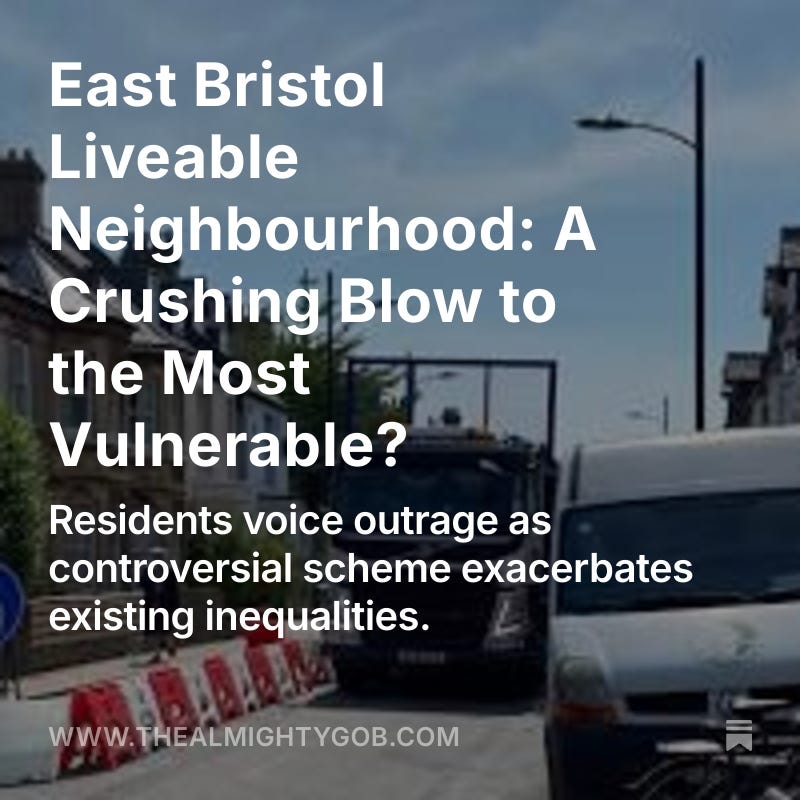#Bristol's Green Gamble: Ignoring Lessons from Failed LTNs and Fueling Community Fury?
Bristol's Blind Eye? Why Proceed When Others Have Failed?
Despite a growing graveyard of unsuccessful Low-Traffic Neighbourhood schemes across the country, Bristol's Green administration pressed ahead, raising serious questions about its motivations, engagement with residents, and whether ideological zealotry trumped practical evidence and community needs.
Bristol is simmering with a growing sense of disconnect. A chasm has opened between the city council, led by the Green Party, and many of its residents. This isn't a sudden rift, but a gradual erosion of trust, fuelled by a perception of decisions being imposed from above, particularly concerning the rapid and often controversial implementation of "Liveable Neighbourhoods" (LTNs) and other traffic management measures. The air crackles with accusations of ignored voices, prioritised ideologies, and a council seemingly deaf to the daily realities of its diverse communities.
The core of this discontent appears to lie in the Green administration's unwavering commitment to LTNs, schemes designed to reduce through-traffic in residential areas to promote active travel and improve air quality. While the aims are laudable on paper, the reality unfolding in Bristol mirrors a pattern of failure witnessed in other English towns and cities.
The Ghost of LTNs Past: A National Pattern of Reversal
The evidence of LTN schemes failing to deliver on their promises and sparking significant community backlash is mounting. In Ealing, London, the council was forced to abandon seven out of nine LTNs in 2021 after analysis revealed "no material change in air quality" in most areas, with traffic even increasing in one. This reversal came amidst fierce public opposition, with surveys showing overwhelming disapproval from residents within the affected zones.
The story is similar elsewhere. In Exeter, Devon, a controversial LTN in Heavitree and Whipton was scrapped in June 2024 after a public consultation revealed over 80% of respondents were against it, citing negative impacts on local businesses and vulnerable residents. Just a year prior, in June 2023, Warrington, Cheshire, removed a trial LTN in Westy, Latchford, despite data suggesting it achieved its aims of reducing traffic. The reason? It proved deeply unpopular with the majority of residents who participated in the consultation.
These examples highlight a critical flaw in the implementation of LTNs: a frequent failure to secure genuine local support and adequately address the practical concerns of those most affected. Increased congestion on boundary roads, negative impacts on local businesses due to reduced access, difficulties for residents with mobility issues or those reliant on cars for essential travel, and concerns raised by emergency services about potential delays have all contributed to the downfall of these schemes. Crucially, a perceived lack of meaningful consultation before implementation has consistently ignited resentment and resistance.
Given this clear pattern of unsuccessful LTN implementations and the ensuing community anger across the country, the question for Bristolians becomes stark: why did the Green administration seemingly ignore these lessons and forge ahead with their own schemes? Was this a case of political inexperience blinding them to the practical realities? Or was there a zealous belief that Bristol would somehow be different, that their approach would magically overcome the pitfalls that plagued other areas?
The growing sense of marginalisation in Bristol suggests that the latter may be closer to the truth. The feeling is that the Green administration, driven by its environmental agenda, has prioritised ideological goals over the lived experiences and needs of a significant portion of the city's population. The rapid rollout of LTNs and traffic measures, often perceived as lacking genuine community consultation, has only amplified this sentiment. Residents feel their voices are not being heard, their concerns dismissed, and their daily routines disrupted without adequate justification or consideration.
This perceived top-down approach has fostered resentment, particularly among motorists and those who feel their livelihoods or personal circumstances are negatively impacted. Concerns about affordability, housing, and the cost of living further compound these feelings of alienation, with many in less affluent areas believing their more pressing needs are being sidelined in favour of ambitious, long-term environmental targets. The disconnect is further exacerbated by a perceived inadequacy in the council's communication and engagement strategies, failing to effectively reach and involve diverse communities in meaningful dialogue.
A Hypothetical Bridge to Unity: Could a Different Path Be Forged?
In this climate of growing frustration, a hypothetical manifesto, "Bristol's Bridge to Unity," would offer a stark contrast to the current approach. One that champions genuine community engagement, advocating for accessible forums, citizen assemblies held in affected communities, and transparent consultation processes that truly listen to and incorporate resident feedback. A manifesto that emphasises balanced transport solutions, calling for thorough impact assessments of LTNs, investment in public transport, phased traffic calming measures, and support for the transition to electric vehicles.
Furthermore, it would address broader concerns of affordable housing and economic opportunity, practical environmental sustainability, transparent and accountable governance, and safety and community cohesion. This hypothetical vision would prioritise practical solutions and a collaborative approach, suggesting a way to bridge the widening gap between the council and the community by genuinely valuing the voices and needs of all Bristol residents.
A Metro Mayor Candidate’s Pledge: A Sign of Shifting Tides?
The Bristol Post's report today, April 8, 2025, that former city councillor and current Metro mayor candidate Steve Smith has pledged to halt all new funding for liveable neighbourhood schemes if elected, further underscores the growing discontent surrounding these policies. Smith's stance suggests a recognition of the issues raised by residents and a potential shift in political priorities.
The question remains: will Bristol's Green administration finally acknowledge the mounting evidence and the growing community frustration? Will they learn from the mistakes made in other cities and adopt a more inclusive and pragmatic approach to urban planning? Or will they continue down a path that risks further alienating residents and deepening the sense of marginalisation, driven by a conviction that they alone hold the "right" answer, despite the chorus of dissenting voices and the lessons etched in the failures of LTNs elsewhere? Only time will tell if Bristol's "Green Gamble" will ultimately lead to a truly liveable city for all, or a city fractured by ignored evidence and a perceived disregard for the needs of its diverse communities.



